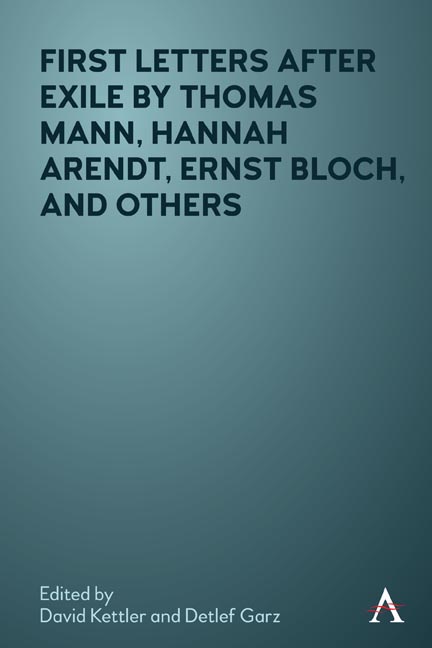Book contents
- Frontmatter
- Contents
- Preface
- Chapter 1 The “First Letters” Exile Project: Introduction
- Chapter 2 “That I Will Return, My Friend, You Do Not Believe Yourself ”: Karl Wolfskehl – Exul Poeta
- Chapter 3 “I Do Not Lift a Stone”: Thomas Mann’s “First Letter” to Walter von Molo
- Chapter 4 Faust Narrative and Impossibility Thesis: Thomas Mann’s Answer to Walter von Molo
- Chapter 5 “That I Am Not Allowed for a Moment to Forget the Ocean of Blood”: Hans-Georg Gadamer and Leo Strauss in Their First Letters after 1946
- Chapter 6 Return into Exile: First Letters to and from Ernst Bloch
- Chapter 7 A Postwar Encounter without Pathos: Otto Kirchheimer’s Critical Response to the New Germany
- Chapter 8 An Exile’s Letter to Old Comrades in Cologne: Wilhelm Sollmann’s Critique of German Social Democracy and Conception of a New Party in Postwar Germany
- Chapter 9 First Letters: Arendt to Heidegger
- Chapter 10 Denazification and Postwar German Philosophy: The Marcuse/Heidegger Correspondence
- Chapter 11 “It Would Be Perhaps a New Exile and Perhaps the Most Painful”: The Theme of Return in Oskar Maria Graf ’s Letters to Hugo Hartung
- Chapter 12 Social Constellation of the Exile at the End of the Second World War and the Pragmatics of the “First Letters”: An Objective Hermeneutic Structural and Sequence Analysis
- Notes on Contributors
- Index
Preface
Published online by Cambridge University Press: 25 February 2022
- Frontmatter
- Contents
- Preface
- Chapter 1 The “First Letters” Exile Project: Introduction
- Chapter 2 “That I Will Return, My Friend, You Do Not Believe Yourself ”: Karl Wolfskehl – Exul Poeta
- Chapter 3 “I Do Not Lift a Stone”: Thomas Mann’s “First Letter” to Walter von Molo
- Chapter 4 Faust Narrative and Impossibility Thesis: Thomas Mann’s Answer to Walter von Molo
- Chapter 5 “That I Am Not Allowed for a Moment to Forget the Ocean of Blood”: Hans-Georg Gadamer and Leo Strauss in Their First Letters after 1946
- Chapter 6 Return into Exile: First Letters to and from Ernst Bloch
- Chapter 7 A Postwar Encounter without Pathos: Otto Kirchheimer’s Critical Response to the New Germany
- Chapter 8 An Exile’s Letter to Old Comrades in Cologne: Wilhelm Sollmann’s Critique of German Social Democracy and Conception of a New Party in Postwar Germany
- Chapter 9 First Letters: Arendt to Heidegger
- Chapter 10 Denazification and Postwar German Philosophy: The Marcuse/Heidegger Correspondence
- Chapter 11 “It Would Be Perhaps a New Exile and Perhaps the Most Painful”: The Theme of Return in Oskar Maria Graf ’s Letters to Hugo Hartung
- Chapter 12 Social Constellation of the Exile at the End of the Second World War and the Pragmatics of the “First Letters”: An Objective Hermeneutic Structural and Sequence Analysis
- Notes on Contributors
- Index
Summary
This book contains a selection of studies from the second phase of two decades of work by international collaborators engaged in a reconsideration of the sources and literature on the exiles from Germany during the Hitler era. The first phase began with a workshop and conference, both held at Bard College in 2001 and 2002, under the general heading of “Contested Legacies,” a theme that referred, above all, to the development in exile of the contrasts and conflicts that had marked German intellectual life during the first decades of the century between the proponents of methodical science embodied in rigorous disciplines and the advocates of Bildung and/or civic education as the locus of national renewal. That work opened questions about the choices for exiles in the postwar period.
While beginning to research these questions in the German Literary Archives in Marbach, Kettler came upon some letters written to and from exiles early in the postwar period, and these seemed to him to bear especially clearly on key issues confronting both exiles and those who had remained behind. Letters provide evidence that is especially valuable in situations most common among the kinds of cases studied, where the breached contacts being tested were largely of an informal, quasi-professional kind, symbolized by periodic conversations in favored coffee houses, more or less tinctured by personal friendships. This applies no less to “open letters” under these circumstances as it does to direct personal contacts.
After publishing a preliminary article that essayed some illustrations of the analytical possibilities of this approach, Kettler was able to organize a conference on the theme at the German Literary Archives in May 2008, with contributions from leading German-speaking scholars, as well as a sequel at Trinity College in November of that year for colleagues resident in North America. Detlef Garz provided opportunities and collaboration for detailed follow-up. The two volumes in German resulting from these workshops are the source of the present collection. As the articles show, the study of exile addresses questions that are not limited to the interests of regional specialists, with local-language skills. The translations from German follow the lead of linguistic practice in English-language usage in this field of study. In view of the exploratory and interpretative character of the focus and the recognized special qualifications of the contributors, no attempts were made to homogenize the approaches.
- Type
- Chapter
- Information
- Publisher: Anthem PressPrint publication year: 2021

